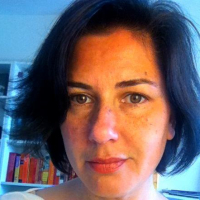Three Palestinian men from Qalandiya, a refugee camp just outside Ramallah, died when they were shot early Monday morning by Israeli border police. The paramilitary security forces entered the camp at about 4.30 to arrest a Palestinian man who had recently been released from prison.
Jihad Aslan, 21, Yunis Jahjuh, 24, and Rubin Zayed, 34 were shot and killed under disputed circumstances. An army spokesperson claimed they were among the demonstrators throwing stones and other objects, which the spokesperson described as “life threatening,” at the security forces. But Palestinian witnesses said that the wanted man was already in custody and had not resisted arrest. For unknown reasons the border police remained in the arrested man's home until approximately6.45 a.m., so that residents of the camp became aware of them when they started leaving their homes for work and school.

According to the Guardian, Palestinian eyewitnesses said the three dead men were shot in the chest. A UNRWA employee was shot in the leg while walking to work.
News of the incident was initially reported by Palestinian news outlets, including the English version of the Bethlehem-based Ma'an News. The international media picked up the story after the Palestine Authority announced that it was canceling peace discussions that were scheduled to take place this coming Monday in Jericho.
According to Haaretz the State Department has denied that the Jericho meeting is cancelled, but Bloomberg and other media outlets are sticking with the story. Meanwhile, the Palestinian news outlet Al Quds published a report that Martin Indyk was in Ramallah to convince the Palestinians not to cancel the meeting.
Harriet Sherwood, the Guardian's correspondent in Jerusalem, tweeted today her Palestinian colleague's observation that the funeral for the three dead men was the biggest he had seen in five years.
The Israeli human rights organization B'tselem announced on its website that its field workers were investigating the incident. Given ample precedent, notes B'tselem, the officers who entered Qalandiya should have known their pre-dawn arrest would be the catalyst for a potentially violent response from camp residents. They should have been better prepared to use non-lethal crowd control measures, asserts B'tselem, in order to prevent the shooting deaths. B'tselem added: “There is also room for grave suspicion that not all possible measures were taken to prevent this result, including the consideration of alternative modes of operation, and that the forces made excessive use of lethal weapons.”
Both the first and second Intifadas began with violent altercations that spiraled rapidly into widespread demonstrations. Reports of today's mass funerals seem to carry a worrying subtext that goes beyond concern about the cancelled peace talks.






